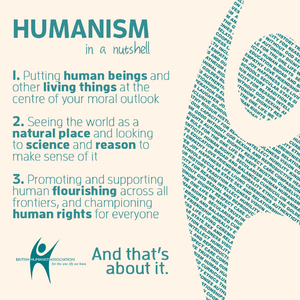Humanism

Humanism is a progressive philosophy of life that, without theism or other supernatural beliefs, affirms our ability and responsibility to lead ethical lives of personal fulfillment that aspire to the greater good.
– American Humanist Association
Humanism is a rational philosophy informed by science, inspired by art, and motivated by compassion. Affirming the dignity of each human being, it supports the maximization of individual liberty and opportunity consonant with social and planetary responsibility. It advocates the extension of participatory democracy and the expansion of the open society, standing for human rights and social justice. Free of supernaturalism, it recognizes human beings as a part of nature and holds that values-be they religious, ethical, social, or political-have their source in human experience and culture. Humanism thus derives the goals of life from human need and interest rather than from theological or ideological abstractions, and asserts that humanity must take responsibility for its own destiny.– The Humanist Magazine
Humanism is a democratic and ethical lifestance which affirms that human beings have the right and responsibility to give meaning and shape to their own lives. It stands for the building of a more humane society through an ethics based on human and other natural values in a spirit of reason and free inquiry through human capabilities. It is not theistic, and it does not accept supernatural views of reality.
– The International Humanist and Ethical Union
Humanism is an approach to life based on reason and our common humanity, recognizing that moral values are properly founded on human nature and experience alone. – The Bristol Humanist Group[3]
International Humanist and Ethical Union - We live in a natural World[править]
"There are no gods or “ghosts in the machine”. There is no divine realm. Of course there are strange or as yet unanswered questions about the world, but when we really know or understand the answers then these phenomena are always brought into the natural world, or under the laws of nature (or however you like to think of it). This view is also sometimes known philosophically as naturalism.
Naturalism usually entails atheism (dissent from the existence of a God or gods) or at least some form of agnosticism (the idea that the existence of gods is unknown or unknowable, or even a meaningless question).
“Isn’t it arrogant to rule all these things out?” Naturalism readily accepts that we might discover profoundly strange answers to certain questions. For example, it’s possible we will one day discover a greater frame for our present reality: the best science may tell us that the universe is a holographic simulation or part of a wider multiverse! But any such discovery would then be part of “our reality” or the total “nature” of the universe; the discovery would not be protected by divine mystery, or sealed off by a supernatural barrier. So, naturalism’s dissent from “the supernatural” is not an arrogant prejudice about what exists, but a kind of logical or conceptual or methodological constraint. (For a naturalist, it seems far more arrogant to assert the existence of such things as spirits, gods, or otherworldly realms.)
“But don’t we sometimes learn amazing new things?” Yes, the universe is often surprising! But when humanity does discover strange new things about the universe we live in, they are usually quite unexpected (such as evolution! other galaxies! quantum mechanics!). Such discoveries rarely cohere neatly with supernatural elements of ancient mythology.''[4]
External Links[править]
- Humanists UK
- American Humanist Association
- Edge.org Essay THE NEW HUMANIST By John Brockman -December 2001
- International Humanist and Ethical Union
 Humanism on Wikipedia
Humanism on Wikipedia